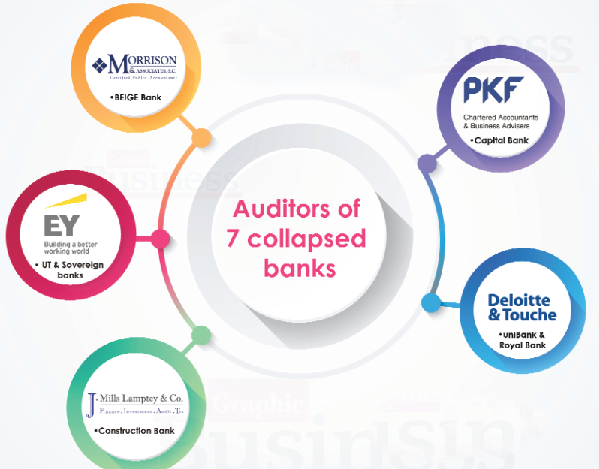
Collapse of banks: Auditors failed everybody
Bankers are demanding a national conversation on how to restore trust in audited financial statements after seven banks collapsed in a spate of 12 months for irregularities that include manipulation of audited accounts.
The integrity is needed to repose confidence in audited accounts, especially at a time when an increasing number of corporate borrowers are also unduly polishing their financial accounts to obtain credit from financial institutions.
“This is a very serious matter that as a country, we need to take into account,” the President of GAB, Mr Alhassan Andani, told the GRAPHIC BUSINESS in an interview.
“Apart from the banks not preparing, as reported, good accounts, even firms that banks deal with do not prepare good accounts and they condone or whatever.
“I think that the matter of the conduct of auditors for these banks and for that matter all firms that report wrong figures must be taken into full account,” he said.
Affected auditors
Mr Andani, who heads Stanbic Ghana Limited, told the paper that such acts smack of criminality and the culprits must be made to face the full rigours of the law.
In the case of the five banks – Royal, Construction, BEIGE, uniBank, and Sovereign – whose licences were withdrawn on August 1, Mr Andani said some of their auditors failed to live up to their sacred responsibilities as objective examiners of financial statements and independent checks against fraudulent activities in the now defunct banks.
By failing to detect the irregularities and flag same in the audited accounts, Mr Andani stated that the auditors “failed everybody” – from shareholders to customers – who relied on the audited accounts of the erstwhile banks to make decisions.
“The auditors failed everybody else who relied on audited accounts; the auditors failed customers who relied on the banks’ accounts, the auditors failed the tax authorities, they failed the regulator, other banks and all third parties that
ICAG declines
The result, he said, was the loss of the banks, which prompted the government to intervene by establishing the Consolidated Bank Ghana Limited with a capital base of GH¢450 million to take up some of their assets and liabilities.
Requests for comments from the Institute of Chartered Accountants, Ghana (ICAG), a professional body of accountants and auditors, and some of the auditing firms, were turned down.
However, a former Senior Partner of
“To some extent, they should have used their
Lessons to bankers
Beyond capitalising the Consolidated Bank with GH¢450 million, the purchase and assumption (P&A) agreement, which central bank approved on August 1, will further cost the taxpayer GH¢5.76 billion through the issuance of a bond.
The collapse of the five banks brings to seven (UT and Capital banks collapsed in August 2017) the number of banks that have collapsed. It also brings to GH¢8 billion, the amount used from the public purse to cater for the inequities of private transactions in the banking sector.
Mr Andani said the dissolution of the banks, although painful, should represent a learning curve for bankers and players in the financial sector.
One of those lessons, he indicated, was how to prevent auditors from endorsing accounts that did not represent the true state of the audited institutions and in the process,
“There are questions for auditors to answer,” he said.
“Auditors, as you know, are licensed organisations that are supposed to give, not just customers and shareholders, but the entire economy confidence in the operations of firms.”
As people licensed by law to authenticate the accounts of firms, Mr Andani said third parties who did not have a complete view of the operations of the firms relied on the work of those auditors to make decisions and the compromised nature of such accounts left much to be desired.
As a result, he said the association would add that to the list of issues that it would be seeking the central bank’s intervention to help address.